- Home
- J. T. Edson
The Floating Outfit 17 Page 4
The Floating Outfit 17 Read online
Page 4
‘I don’t know, Mort,’ Geraldine mused. ‘You’re a mystery to me!’
Although her generation had not been encouraged to believe casual sexual intercourse at every opportunity was the ultimate in human achievement, the girl had found the guide a most interesting man. Her feelings had not arisen from a desire to discover how he might perform as a bed-mate, but because he was a person far outside her previous experience. In many ways, he was far more knowledgeable than she would ever be. Yet, in others, she sensed he was as unknowing and vulnerable as a child. Since they had met, he had behaved with politeness and courtesy; but he had always kept her at a distance, steadfastly refusing even to come to first name terms with her as he quickly had with her brother.
At first, Geraldine had wondered whether the guide objected to having a woman forced upon him, or believed she would prove a nuisance on the hunting expedition. If so, he had never mentioned it. In fact, he had soon expressed satisfaction over her behavior and willingness to accept the lack of comforts to which she was accustomed. Remembering that her brother had mentioned Mort had had an Indian mother, she wondered if this could be the reason for his attitude towards her. Yet, should this have been the case, he had never made any attempt to conceal his parentage.
Unknowingly, the girl had discovered the reason for the guide declining to become too closely associated with her!
While his father had been a rancher and mustanger, Texas born and raised, and his mother the daughter of a Kweharehnuh ‘name warrior’, it was only recently Mort had become subjected to prejudice on account of his mixed blood to any great extent. During his formative years, he had spent his time equally in the company of people of both parents. In addition to having been accepted for his good qualities, he had made many friends amongst each. Then, serving under the command of Colonel John Salmon ‘Rip’ Ford in the Army of the Confederate States, 12 his abilities as a fighting man and the skills learned from the maternal side of his family had earned him the whole-hearted respect of his comrades-in-arms, which had overridden petty considerations of race and religious creed.
A similar state of affairs had existed when, needing to earn money in the impoverished conditions prevailing after the War Between the States, he had acted as a civilian scout for the 2nd United States’ Cavalry. Their duties had been concerned solely with the policing of the border country along the Rio Grande, fending off the depredations of bandidos and Indians from Mexico who had grown accustomed to finding easy pickings in Texas during the years of the War. As he had not been helping in any way to enforce the worst aspects of ‘Reconstruction’, imposed by corrupt ‘carpetbagger’ politicians given control of the State and its disfranchised white populations by the Federal Government, 13 he had avoided the stigma which might otherwise have accrued amongst his fellow Texans over his having taken such a form of employment.
Nor had Mort been made to suffer on account of his mixed parentage when the death of his father had brought him back to run their small VL ranch. Neighbors of long standing, with one exception, the local ranchers and cowhands were more concerned with making use of his specialized talents when helping them deliver herds of cattle to what few markets were available, and in hunting down four-legged predators preying upon their livestock to care that his mother had not been white. Even the antipathy of the exception did not have its basis on prejudice as such. A bitter, crabbed and unpleasant man, old Dexter Chass disliked every other human being—with the possible exclusion of his only offspring—on principle. Although resenting all who lived anywhere near him with an equal impartiality, he had never forgiven Victor Lewis for having arrived first and settled upon land with water rights he craved, regardless of the fact that he had always been allowed access to the latter. He had turned the hostility he felt from the dead father to the living son.
Furthermore in those days, the few occupants of what was then no more than a small hamlet without an official name—being referred to locally as, ‘Holbrock’s’, after its most affluent citizen—in the center of that section of the range had never raised the slightest objections to the presence of Mort on their respective premises. To them, he had been another source of revenue in an area which provided an all too diminutive amount of available trade. One, moreover—despite a penchant of joining in the wild fun and games of the cowhands—who could pay for his purchases with negotiable cash.
Not until a more profitable means of exploiting the enormous number of half longhorn cattle—which had been allowed to breed and multiply practically unmolested by human beings during the four years of civil conflict—was discovered and commenced, 14 had the situation begun to change for the worse as far as Mort was concerned. In fact, at the very time when he should have started to enjoy the benefits which had accrued as a result of all his hard work and the risks he had taken, he had discovered this was not to be.
Regrettably, the improvement in the financial conditions of the Lone Star State in general had come too late for many of the local population to benefit. Tired of struggling to make ends meet, when compelled for want of more lucrative markets to sell their cattle to hide and tallow factories for around four dollars a head with calves thrown in free, 15 several of the ranchers had decided to call it quits when offered cash ‘on the barrelhead’ for their respective spreads.
All of the properties had fallen into the control of one man!
How David Masefield Stewart had come by the not inconsiderable amount of money with which he made the purchases was never asked. Or, if it had been, those who sought information upon so personal a matter had not divulged the answer to others. His methods of making the acquisitions had not been open to criticism. Although he frankly admitted his origins were north of the Mason-Dixon line and that he had served the North during the War, he had no apparent connections with the administration of Governor ‘Carpet-bag’ Davis and the ‘Reconstructionists’. Furthermore, all things considered, he had paid a fair price for each ranch.
However, the men whom Stewart had used to replace such cowhands who had objected to working for a Yankee—and they were in the majority, at each spread he obtained—were not of their easy-going and tolerant kind. Obviously selected as much for their ability to handle dissension against his wishes as for merely working on the range, the replacements qualified for the name that John Chisum—already a ‘cattle baron’ of less than savory repute 16—referred to with false joviality as ‘warriors’. Therefore, Stewart’s predilection for hiring men of that kind had been regarded with something close to suspicion by Mort, whose property—along with that owned by Chass—was all he had not acquired in the area. Not that the Yankee had given any hint of wanting to add their spreads to his holdings, but the two properties were essential should he wish to increase the land already under his control. Regardless of the original misgivings he had caused, and while his pleasant attitude had not been duplicated by all his men, he had always treated Mort in a friendly fashion and never hesitated before asking advice in matters pertaining to the cattle business.
It was, in part, at the instigation of Stewart that Mort was accompanying the Thatchers on the hunting trip!
The changes amongst the local population had not been restricted to the ranches. Attracted by the prospect of being able to make a good profit as conditions in the Lone Star State improved, other newcomers had arrived. Town dwellers by preference and vocation, they too had their origins in the northern and eastern States and set themselves up in a variety of trades of professions. Finding the hamlet had offered an ideally central location, they had established their homes and businesses there. This had caused it to grow into a thriving, if not yet overlarge, town with—although the man in question was now dead—the name changed to ‘Holbrock’. It had, furthermore, been elevated to the status of ‘seat’ for a newly created county of the same name and now could boast a sheriff, who also served as town marshal, to enforce its law and order.
However, while the newcomers catered for a variety of needs and luxuries which the
hamlet had been too limited in scope to offer, removing the necessity of travelling to some more populous region when such commodities were required, they too were not like the native Texans they had supplanted. Most of them were lacking in the open hearted acceptance of a man for what he was, rather than on account of his wealth or lineage, characteristic of people sharing common bonds of survival against the many perils of the vast frontier lands west of the Mississippi River in general, and amongst cowhands of Texas in particular. Frequently professing their stout Christian beliefs, these were of the kind where charity began at home and, in all too many cases, that was where it also ended.
Despite having shown themselves willing and even eager to accept the trade put their way by Mort while establishing their businesses, later—particularly when references to his already long dead mother began to circulate—the new citizens of the town, especially the wives, had refused to consider him as a social equal. Never a seeker after their company, or even desirous of attaining their acceptance socially, at first he had not been worried by their attitude. He had, in fact, derived a certain sardonic amusement from noticing how those with whom he dealt were still far from slow in taking advantage of the trade he was putting their way.
Being of a more tolerant nature than those responsible for the prejudices, Mort had conceded there might be just cause for some of the misgivings directed his way. Cowhand horseplay, in which he had frequently indulged along with friends from other ranches, was rarely appreciated by the staid town dwellers in any area. Nor had the citizens of Holbrock been any more enamored of the more serious brawls which occurred when he had come into contact with some of the new men hired by Stewart. In each case, it had been established by Sheriff Jerome Dickson—as honest and fair a peace officer as ever pinned on a badge, despite having been appointed by the Governor—and accepted by their employer, that he was not the instigator of the fracas. However, being new to the West and its ways, the citizens might have assumed there was no smoke without fire. Certainly, possessing a streak of stubborn pride in his make-up, he had never backed away when threatened or abused. Instead, he had demonstrated—if less lethally than might have been the case, considering his Comanche upbringing—a fighting ability as rough as anything employed against him.
If it had not been for meeting with Rose Humboldt, Mort would have paid no attention to the way in which the newcomers regarded him. However, they had been attracted to one another from the beginning and their feelings had blossomed into love. Being a man of honor, trained to respect such proprieties, he had made no attempt to conceal this state of affairs from her parents. Despite having what many people would have considered reasonable prospects, on having broached the subject with her father, he was ordered never to set foot upon the Humboldt property again—in terms which could have brought grave repercussions against the speaker if Mort had not just managed to keep his temper under control—and the girl was sent to stay with an aunt somewhere in New England. Nor had the wrath of the irate father been appeased by these measures. Furious at a ‘half-breed’ having had the audacity to seek the hand of his only child in matrimony—and not a little frightened by the danger in which, he sensed, his blistering tirade could have placed him—Brenton Humboldt had began to exert all the power, offered by being the most wealthy citizen, justice of the peace and owner of the Mercantile & Cattlemen’s Bank of Holbrock, towards persuading the town to turn Mort into a social leper.
Paying a visit to the VL ranch house to discuss business with its owner, David Masefield Stewart had found him in a mood of black depression. On being told of the request to act as guide for the Thatchers, he had advised Mort to accept. He had claimed the absence of four or five weeks, which was all the time the hunting trip would take, would allow the affair to die down, and he had promised to do all he could to smooth things over whilst the other was away. Concluding he was hearing good sense and finding the thought of remaining in the area less than pleasant to contemplate, Mort had sent off his confirmation to accompany First Lieutenant James Thatcher. It had not been until they met that he discovered Geraldine was going with them.
Therefore, in one respect, the girl was correct in assuming Mort had misgivings over her company.
However, the feelings of the guide had little to do with doubting whether she could stand up to the rigors of the trip. That aspect had been settled to his complete satisfaction within twenty-four hours of their meeting. While he had soon found her presence far from unpleasant, unlike members of a later and more pampered generation, his ego did not require the boost of trying to attain a conquest sexually where she was concerned. Furthermore, being surprisingly sensitive under his rugged exterior, he had even shied from letting himself appear too friendly in case his motives should become suspect and be met with an attitude similar to that of Brenton Humboldt on the part of her brother.
Hearing one of the horses give a snort of alarm, Geraldine’s thoughts were diverted from Mort!
Looking around without rising, but picking up the Navy Colt almost instinctively, the girl discovered six men were entering the clearing!
Coming from the direction by which Geraldine’s party had arrived, the newcomers were on foot.
One was a tall, lean, untidily dressed, albeit well-armed white man of unprepossessing appearance!
The others, all carrying weapons, were Indians!
Five
They Ain’t Kweharenhnuh
As was only to be expected, Geraldine Thatcher experienced a sensation of alarm over the arrival of the six men!
Yet, due to the faith she had in Morton Lewis, the girl found the sight of the five Indians more reassuring than she might otherwise have done considering their unwholesome looking companion!
Studying the latter, Geraldine concluded she would have felt much more perturbed if they had all been white and looked as unsavory as him!
To the untutored gaze of the girl, he appeared to be dressed after the fashion of a cowhand. However, the few she had met during her short time in Texas had invariably treated her with courtesy and respect. Her instincts suggested such an attitude might not be displayed in this case.
Eyes schooled to read the signs of the west would have decided the man was ‘trouble on the hoof!’
There were lines of dissipation and implied evil on an aquiline face which, apart from being sallow—almost wax like—was indicative that he had a proportion of Indian blood. Like Mort, he wore Indian leggings and moccasins, but his headdress was a battered and dirty black Burnside campaign hat. However, his shoulder long, greasy black hair, unshaven and unwashed features, and far from clean clothing had acquired their condition as a result of deliberate neglect to make any improvements. He had a walnut handled Colt 1860 Army revolver tucked butt forward into the right side of a grubby dark blue silk sash about his middle, and a bowie knife hung in an Indian made sheath at the left side of the leather belt which passed around it.
Despite the slight relief she was feeling over their presence, as their attire was so similar to that of the ‘tame’ braves she had seen on the reservation close to the headquarters of the 2nd United States’ Cavalry at Fort Bracken, Geraldine was disappointed by the appearance of the Indians. She had hoped for something much more impressive from members of the free-ranging Kweharehnuh Comanche who, according to Mort, had so far escaped the ‘blessings’ of life on a reservation and followed the existence of their ancestors, albeit in a somewhat restricted fashion.
All the Indians conveyed the impression of being in their late teens, about half the age of their white companion. Stockily built, of medium height, they had broad and close to Mongoloid coppery brown features decorated by patterns of paint. Their shoulder long black hair was held back by cloth bands of different colors, and none sported so much as a single feather as part of his headdress. Despite wearing castoff white men’s jackets or shirts, they had only breechclouts of various materials below waist level, leggings and moccasins. Three carried firearms, but only old single shot and muzz
le loading carbines which necessitated having powder flasks and bullet pouches suspended about their persons. The other two were armed respectively with a war lance and bow and arrows. All had either a knife or a tomahawk as a side arm.
A significant point, although it escaped the notice of the girl, was that none of the leatherwork displayed by the quintet was made from the hide of a pronghorn!
‘Good afternoon,’ Geraldine said, trying to keep her voice from showing trepidation and holding the Colt Navy Model of 1853 revolver so it would be in view without actually being pointed at the new arrivals. ‘Who are you?’
‘Was fixing on asking you the self-same, gal,’ the white man answered, his voice a far from pleasant, high pitched North Texas drawl which contrived to sound subservient yet somehow menacing.
‘I’m a friend of Mort Lewis,’ the girl announced, watching the men come closer to her at a slow walk, their eyes darting warily about the clearing. Wishing she could remember the name by which the guide was known to the Kweharehnuh Comanche, she went on, ‘Do you know him?’
‘I’ve heard tell of him,’ the white man admitted, right thumb hooking into the sash close to the butt of the Army Colt. ‘He’s a half-breed, what I’ve heard. Where’s he at right now?’
‘He and my brother went after a buffalo bull which was wounded,’ Geraldine replied. ‘They sh—will be back any moment now!’
‘Will, huh?’ the man grunted and, despite giving no indication of having noticed the slip almost made by the girl, he slowed his pace to allow the Indians to move ahead of him.

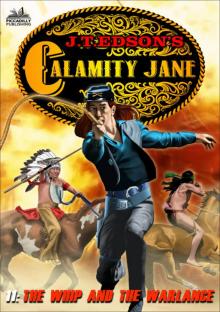 Calamity Jane 11
Calamity Jane 11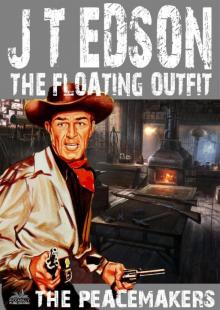 The Floating Outift 33
The Floating Outift 33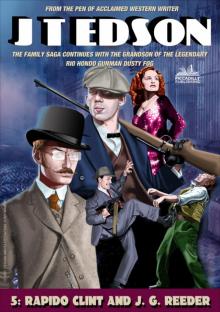 Cap Fog 5
Cap Fog 5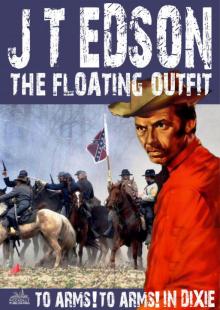 The Floating Outfit 34
The Floating Outfit 34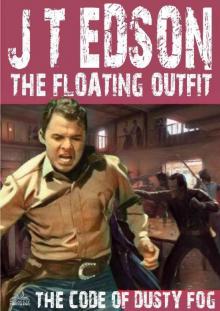 The Code of Dusty Fog
The Code of Dusty Fog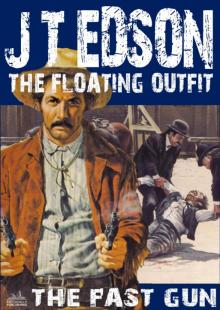 The Floating Outfit 21
The Floating Outfit 21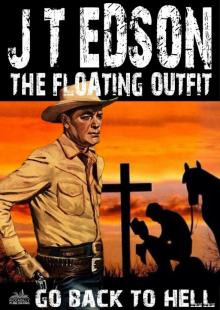 The Floating Outift 36
The Floating Outift 36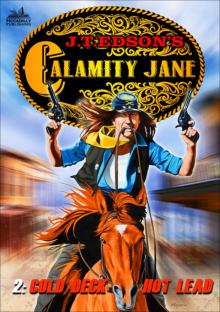 Calamity Jane 2
Calamity Jane 2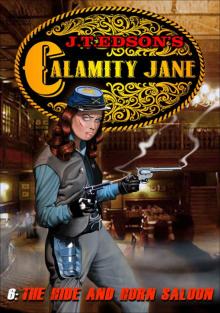 Calamity Jane 6: The Hide and Horn Saloon (A Calamity Jane Western)
Calamity Jane 6: The Hide and Horn Saloon (A Calamity Jane Western)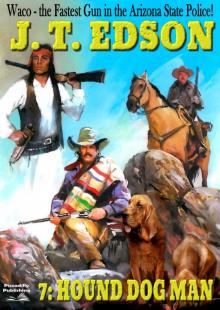 Waco 7
Waco 7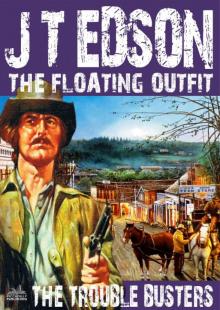 The Floating Outfit 25
The Floating Outfit 25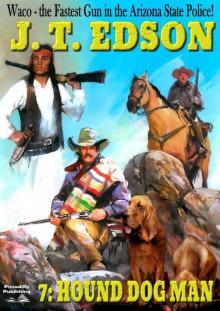 Waco 7: Hound Dog Man (A Waco Western)
Waco 7: Hound Dog Man (A Waco Western)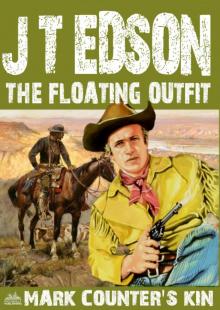 The Floating Outfit 47
The Floating Outfit 47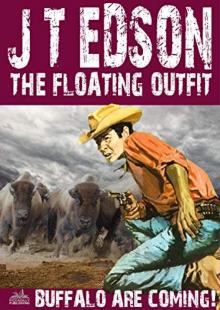 The Floating Outfit 42: Buffalo Are Coming!
The Floating Outfit 42: Buffalo Are Coming!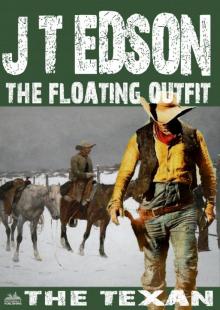 The Floating Outfit 46
The Floating Outfit 46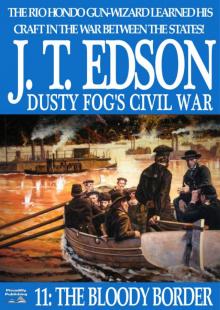 Dusty Fog's Civil War 11
Dusty Fog's Civil War 11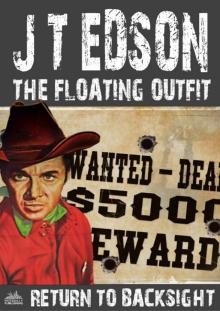 The Floating Outfit 61
The Floating Outfit 61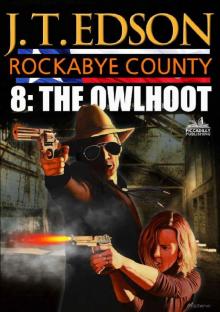 The Owlhoot
The Owlhoot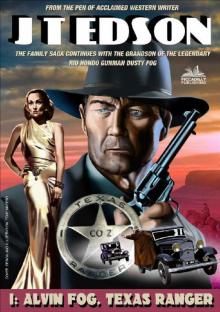 Alvin Fog, Texas Ranger
Alvin Fog, Texas Ranger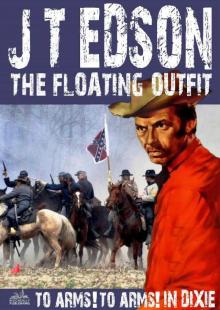 The Floating Outfit 34: To Arms! To Arms! In Dixie! (A Floating Outfit Western)
The Floating Outfit 34: To Arms! To Arms! In Dixie! (A Floating Outfit Western)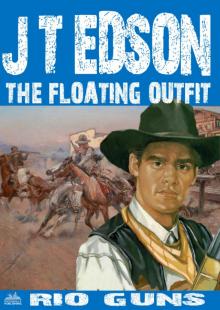 The Floating Outfit 44
The Floating Outfit 44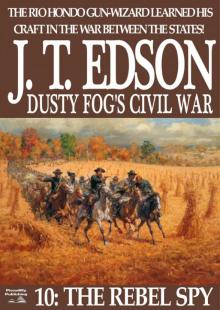 Dusty Fog's Civil War 10
Dusty Fog's Civil War 10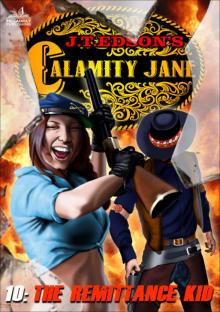 Calamity Jane 10
Calamity Jane 10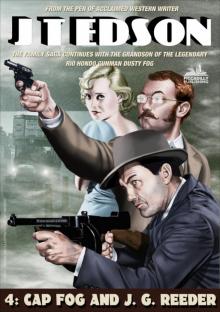 Cap Fog 4
Cap Fog 4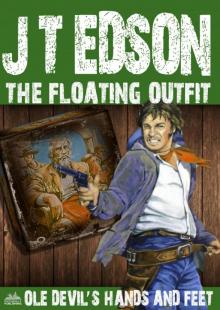 The Floating Outfit 51
The Floating Outfit 51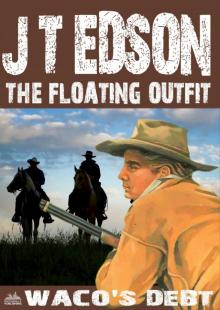 The Floating Outfit 50
The Floating Outfit 50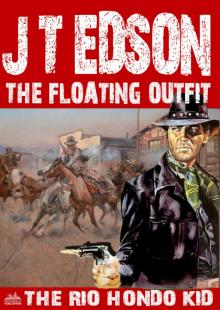 The Floating Outfit 49
The Floating Outfit 49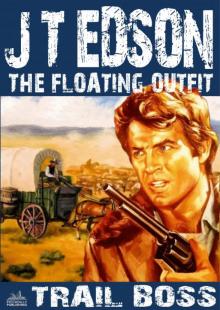 The Floating Outfit 10
The Floating Outfit 10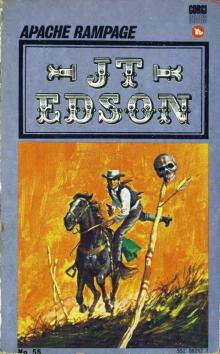 Apache Rampage
Apache Rampage The Floating Outfit 15
The Floating Outfit 15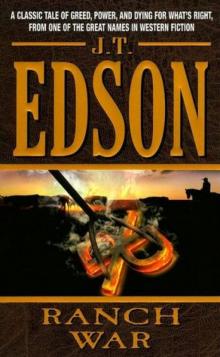 Ranch War
Ranch War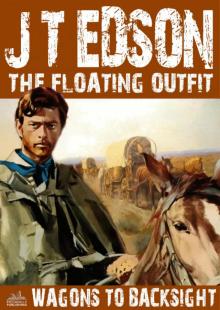 The Floating Outfit 11
The Floating Outfit 11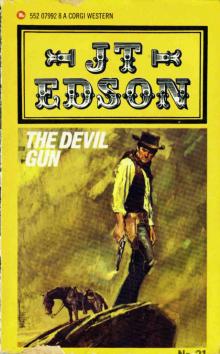 The Devil Gun
The Devil Gun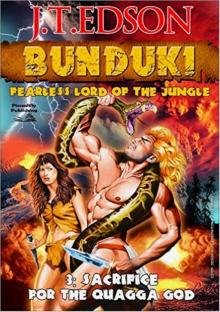 Sacrifice for the Quagga God (A Bunduki Jungle Adventure Book 3)
Sacrifice for the Quagga God (A Bunduki Jungle Adventure Book 3)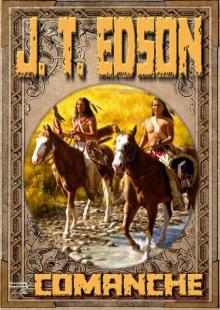 Comanche (A J.T. Edson Western Book 1)
Comanche (A J.T. Edson Western Book 1)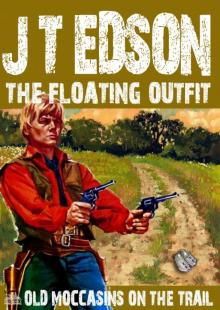 The Floating Outfit 48
The Floating Outfit 48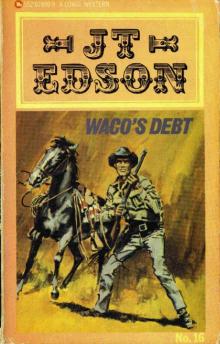 Wacos Debt
Wacos Debt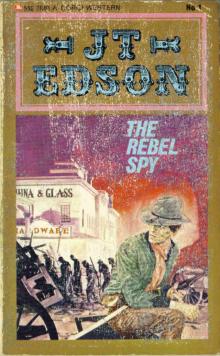 The Rebel Spy
The Rebel Spy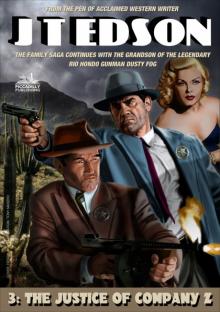 Cap Fog 3
Cap Fog 3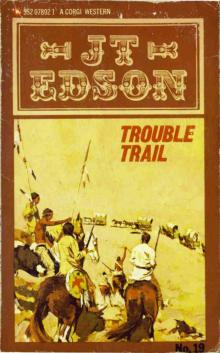 Trouble Trail
Trouble Trail Cold Deck, Hot Lead
Cold Deck, Hot Lead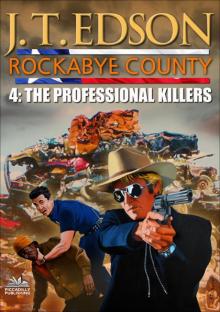 Rockabye County 4
Rockabye County 4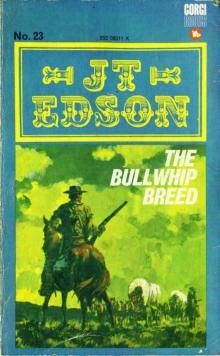 The Bullwhip Breed
The Bullwhip Breed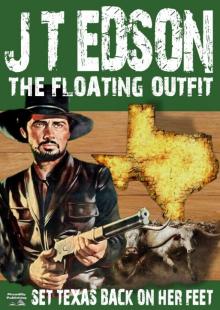 Set Texas Back On Her Feet (A Floating Outfit Western Book 6)
Set Texas Back On Her Feet (A Floating Outfit Western Book 6)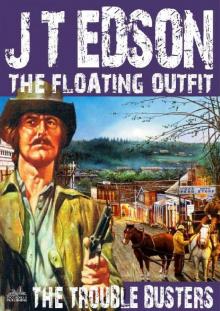 The Floating Outfit 25: The Trouble Busters (A Floating Outfit Western)
The Floating Outfit 25: The Trouble Busters (A Floating Outfit Western)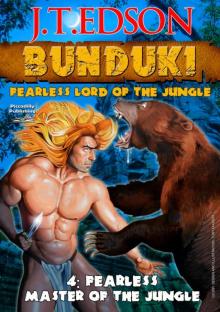 Fearless Master of the Jungle (A Bunduki Jungle Adventure
Fearless Master of the Jungle (A Bunduki Jungle Adventure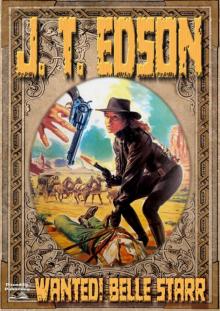 Wanted! Belle Starr!
Wanted! Belle Starr!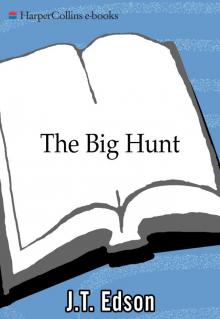 The Big Hunt
The Big Hunt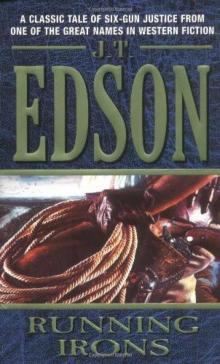 Running Irons
Running Irons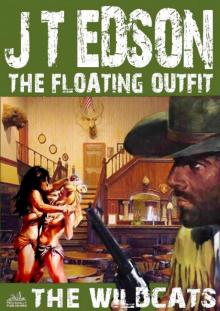 The Floating Outfit 19
The Floating Outfit 19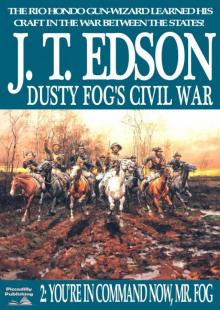 You're in Command Now, Mr Fog
You're in Command Now, Mr Fog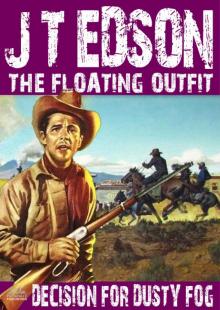 The Floating Outfit 27
The Floating Outfit 27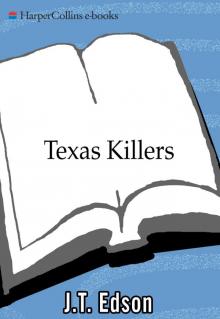 Texas Killers
Texas Killers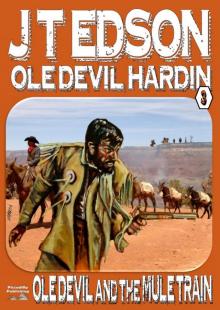 Ole Devil and the Mule Train (An Ole Devil Western Book 3)
Ole Devil and the Mule Train (An Ole Devil Western Book 3)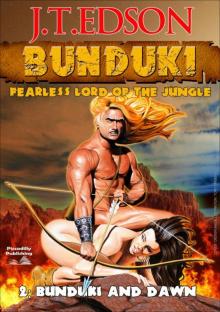 Bunduki and Dawn (A Bunduki Jungle Adventure Book 2)
Bunduki and Dawn (A Bunduki Jungle Adventure Book 2)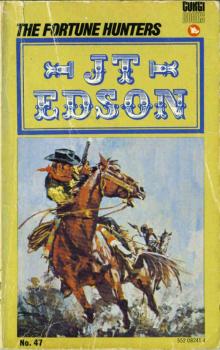 The Fortune Hunters
The Fortune Hunters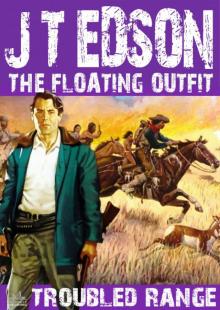 The Floating Outfit 12
The Floating Outfit 12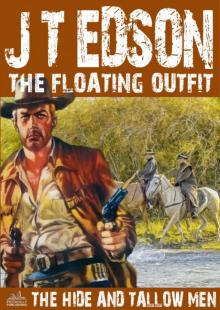 The Hide and Tallow Men (A Floating Outfit Western. Book 7)
The Hide and Tallow Men (A Floating Outfit Western. Book 7)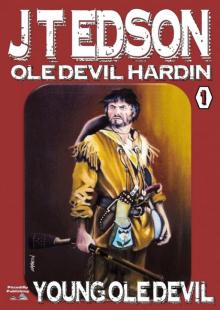 Young Ole Devil
Young Ole Devil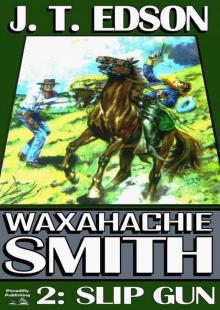 Slip Gun
Slip Gun The Drifter
The Drifter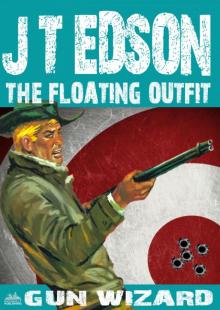 The Floating Outfit 45
The Floating Outfit 45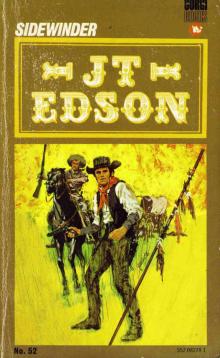 Sidewinder
Sidewinder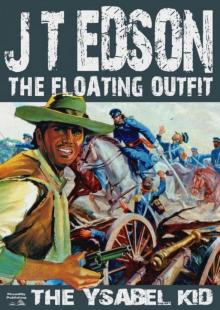 The Ysabel Kid
The Ysabel Kid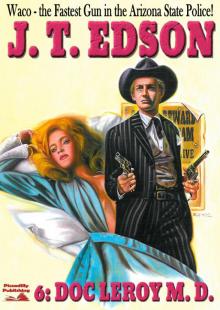 Waco 6
Waco 6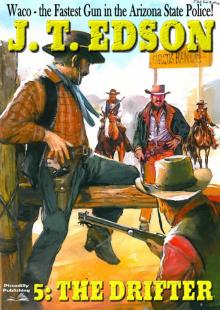 Waco 5
Waco 5 Point of Contact
Point of Contact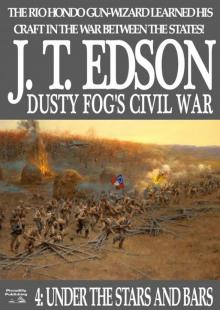 Under the Stars and Bars (A Dusty Fog Civil War Western Book 4)
Under the Stars and Bars (A Dusty Fog Civil War Western Book 4)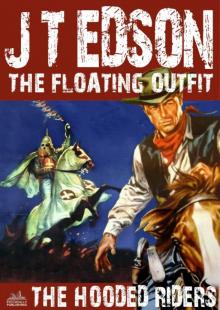 The Floating Outfit 9
The Floating Outfit 9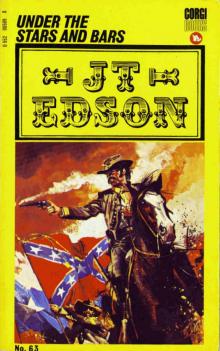 Under the Stars and Bars
Under the Stars and Bars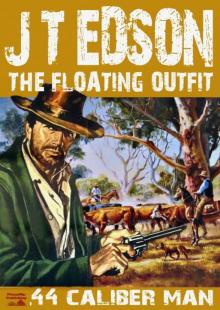 .44 Caliber Man
.44 Caliber Man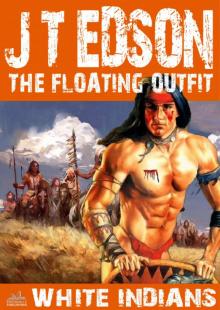 The Floating Outfit 17
The Floating Outfit 17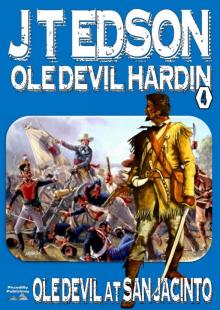 Ole Devil at San Jacinto (Old Devil Hardin Western Book 4)
Ole Devil at San Jacinto (Old Devil Hardin Western Book 4)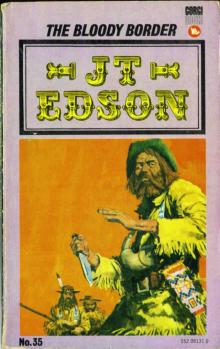 The Bloody Border
The Bloody Border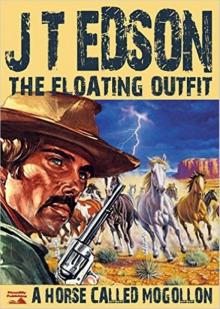 A Horse Called Mogollon (Floating Outfit Book 3)
A Horse Called Mogollon (Floating Outfit Book 3)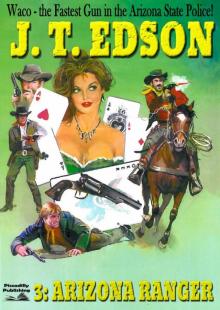 Waco 3
Waco 3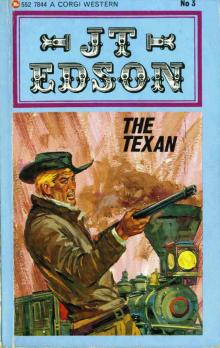 The Texan
The Texan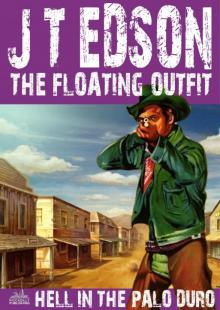 The Floating Outfit 35
The Floating Outfit 35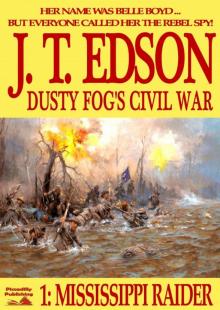 Mississippi Raider
Mississippi Raider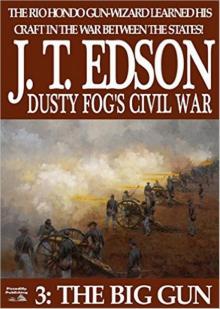 The Big Gun (Dusty Fog's Civil War Book 3)
The Big Gun (Dusty Fog's Civil War Book 3)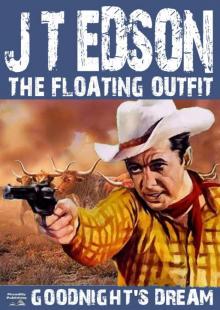 Goodnight's Dream (A Floating Outfit Western Book 4)
Goodnight's Dream (A Floating Outfit Western Book 4) Waco 4
Waco 4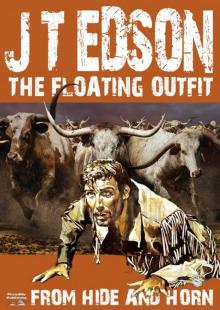 From Hide and Horn (A Floating Outfit Book Number 5)
From Hide and Horn (A Floating Outfit Book Number 5)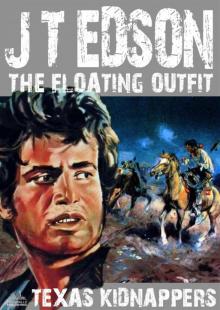 The Floating Outfit 18
The Floating Outfit 18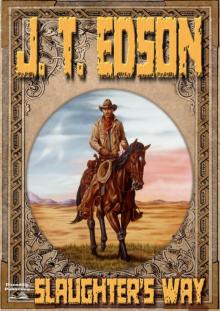 Slaughter's Way (A J.T. Edson Western)
Slaughter's Way (A J.T. Edson Western)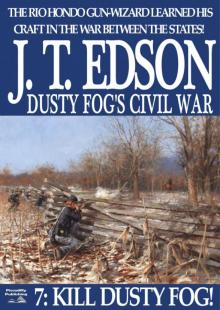 Dusty Fog's Civil War 7
Dusty Fog's Civil War 7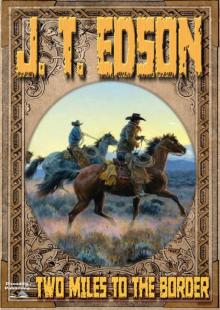 Two Miles to the Border (A J.T. Edson Western)
Two Miles to the Border (A J.T. Edson Western)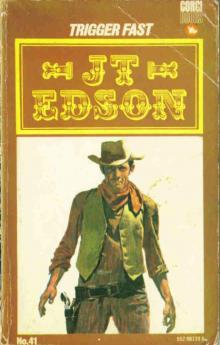 Trigger Fast
Trigger Fast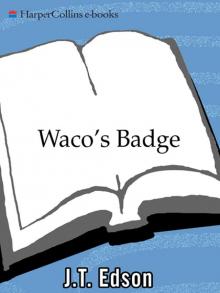 Waco's Badge
Waco's Badge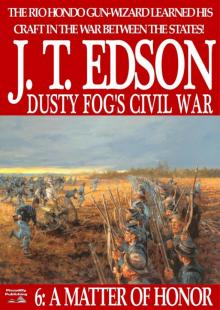 A Matter of Honor (Dusty Fog Civil War Book 6)
A Matter of Honor (Dusty Fog Civil War Book 6)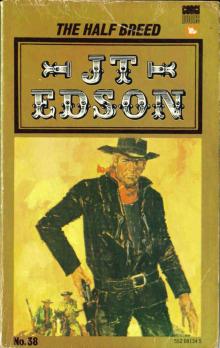 The Half Breed
The Half Breed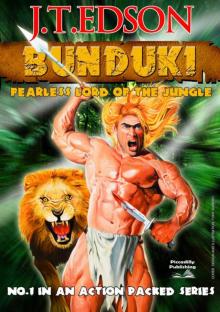 Bunduki (Bunduki Series Book One)
Bunduki (Bunduki Series Book One)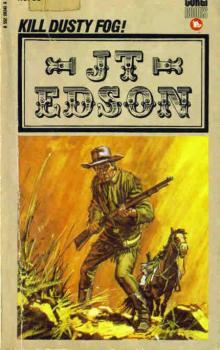 Kill Dusty Fog
Kill Dusty Fog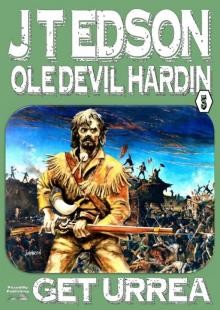 Get Urrea! (An Ole Devil Hardin Western Book 5)
Get Urrea! (An Ole Devil Hardin Western Book 5)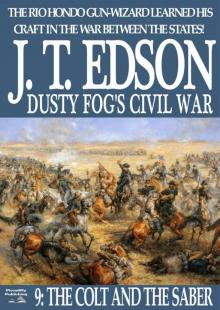 Dusty Fog's Civil War 9
Dusty Fog's Civil War 9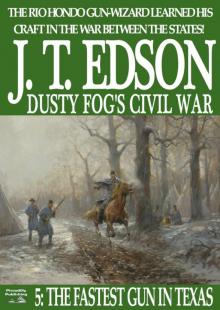 The Fastest Gun in Texas (A Dusty Fog Civil War Book 5)
The Fastest Gun in Texas (A Dusty Fog Civil War Book 5)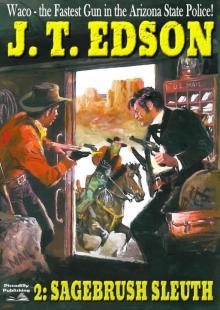 Sagebrush Sleuth (A Waco Western #2)
Sagebrush Sleuth (A Waco Western #2)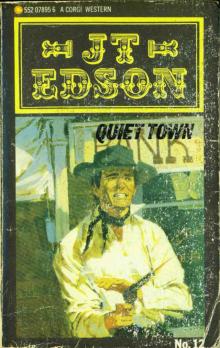 Quiet Town
Quiet Town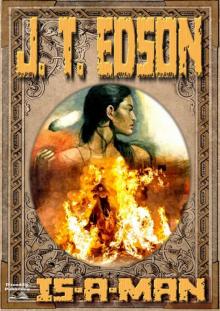 Is-A-Man (A J.T. Edson Standalone Western)
Is-A-Man (A J.T. Edson Standalone Western)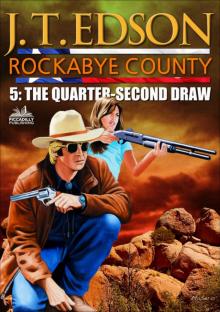 Rockabye County 5
Rockabye County 5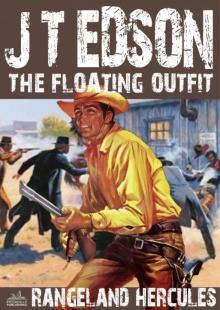 The Floating Outfit 14
The Floating Outfit 14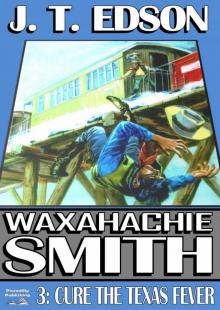 Cure the Texas Fever (A Waxahachie Smith Western--Book 3)
Cure the Texas Fever (A Waxahachie Smith Western--Book 3)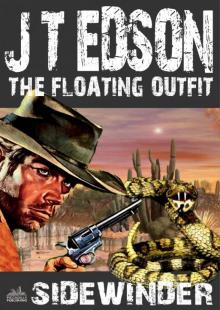 The Floating Outfit 13
The Floating Outfit 13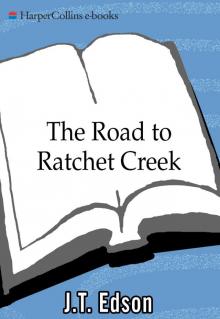 The Road to Ratchet Creek
The Road to Ratchet Creek